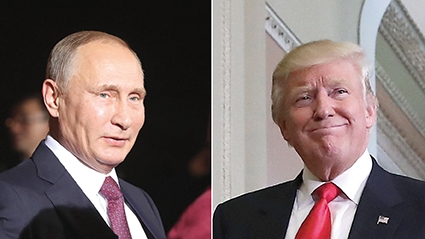Russia & the US Try to Revive Relations
OP-ED
The U.S. lawmakers visited Russia this week in what is considered as a mission to try to help revive much worsened Russian-US relations. The senators also aimed at observing how Russia's economy has been doing after four years of Western sanctions. The main meeting took place with Russia’s foreign affairs minister Sergey Lavrov on July 3.
The senators’ visit in itself is important as there have rarely been any similar events taking place in the last several years. However, what makes this nascent Moscow-Washington cooperation more crucial is the sequence of events leading up to the July 3rd meeting with Lavrov: the visit comes at the time as both countries are preparing for the Trump-Putin summit on July 16 in Helsinki, Finland.
The presidents are expected to discuss a whole rage problematic issues concerning the two states across the Eurasian landmass. Moreover, Russia and the United States have also agreed that their top diplomats will meet after a summit between the two countries' presidents scheduled for later this month, Russian FM Lavrov said.
This also follows Trump’s recent consistent rhetoric that Russia must be readmitted to G8 and the relations be improved.
Quite naturally Ukraine and Georgia became worried as top politicians in Kiev and Tbilisi fear their countries’ core geopolitical interests could potentially be compromised in an apparent Russo-American rapprochement.
Indeed, there is a substance behind the need for Russia-US cooperation. Both countries want improvement in relations primarily in the realms of Syria and Ukraine. It is in the Russian interests to have gain some (even minor) geopolitical concessions from Washington in the time when the western front has been kept pretty much united against the Russian actions in Ukraine since 2014.
However, the intention behind the Russian diplomatic moves (although the visit by the senators seems to be originating from the US) is based in the Russian strategy of trying to divide the the Western opposition. Indeed, the time seems to be ripe for those efforts to succeed. The Transatlantic alliance between the US and the European Union has been strained recently as the US pulled out of the Iran nuclear agreement and heaped additional taxes on European steel and aluminum.
Moscow clearly sees that dangers to the western unity are indeed there, but it is still unclear what will come out of these US-EU economic and diplomatic confrontations. True that for Moscow it will be a big opportunity to use, but the maximum the Russian leadership can hope for is the (partial) lifting of EU sanctions as well as minor concessions in the field of NATO military build-up in eastern Europe. Yet, even if this happens, from a broader perspective, the EU will still hold important leverage in Ukraine as Kiev remains firmly under the European economic influence.
The EU-US disagreements are important, but for the moment not so much as to cause real fractures in the trans-Atlantic partnership. Europe and the US see that they need each other to keep Russia at bay. Europe understands that without the US’ military resolve in eastern Europe, Ukraine’s military capabilities are unlikely to improve, making Moscow less hesitant in its actions on its borderlands.
Same goes for Georgia. In Tbilisi’s understanding, any meandering on Western part would near geopolitical concessions and the increase of Russian influence.
True that it is for the moment unclear what Moscow and the US are hoping for in trying to revive the bilateral relations. There is simply so many fronts where both countries’ geopolitical agendas clash that any prospective cooperation would need a clear concession from either Russians or the Americans. Trump-Putin summit will bring some more clarity into the discussion.
By Emil Avdaliani
Image source: ktla.com












